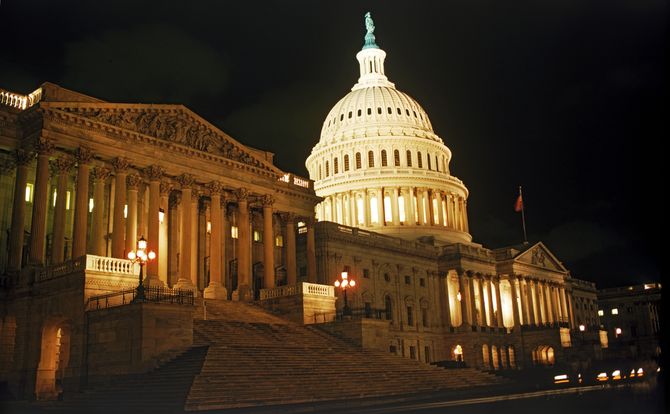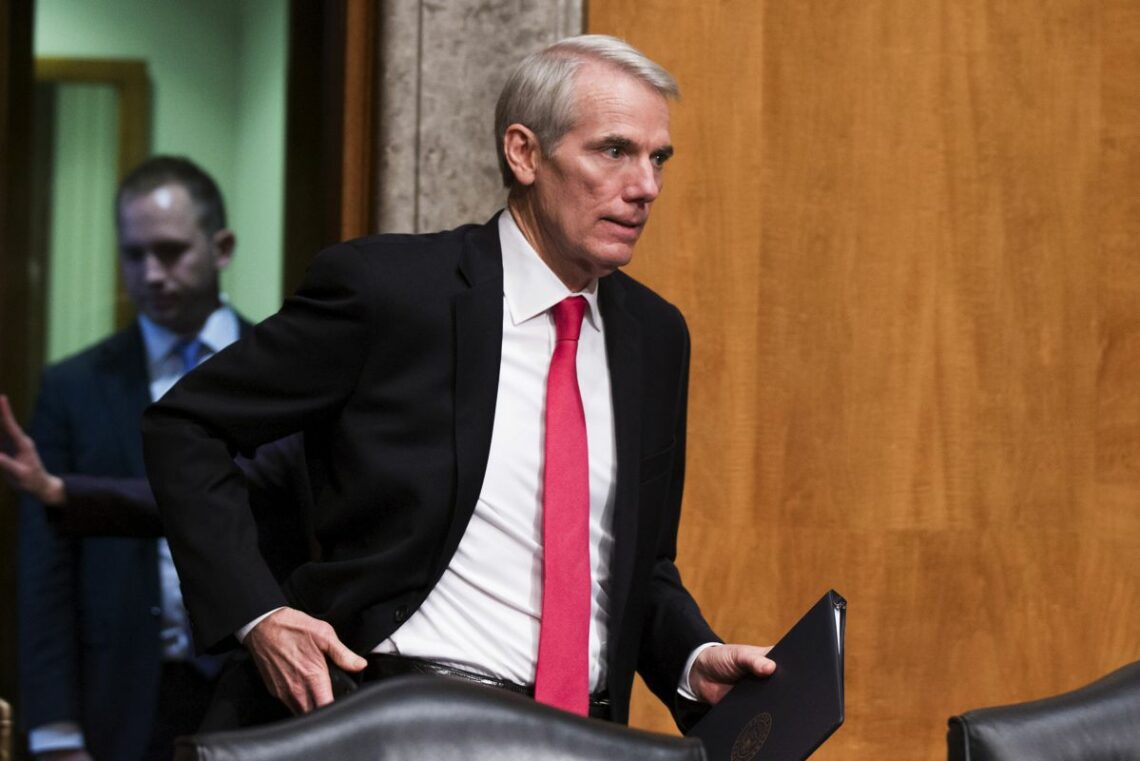Congress uses its prerogatives to shape Asia policy
Analysis of U.S. foreign policy focuses on the executive branch. It makes sense when the same party controls the White House and Congress but does not apply after the Democratic takeover of the House of Representatives. In fact, U.S. lawmakers have been taking an active role in shaping the U.S. approach to the Indo-Pacific region.

In a nutshell
- China’s rise prompted Congress to stop deferring to the business community on policy
- Lawmakers are growing more assertive on human rights and trade, challenging the administration
- Analysis that fails to consider legislative influence over U.S. foreign policy is flawed
Perhaps because it is capable of unified action on policy issues – and therefore comparatively easy to understand – most analysis of foreign policy in the United States focuses almost exclusively on the executive branch. This is particularly true when one party controls both the executive and legislative branches. The Democratic takeover of the House of Representatives and new Republican committee chairs in the Senate, however, will give it a more visible role in developing the U.S. approach to the Indo-Pacific region, most notably on policies toward China, human rights, trade, and North Korea.
Congress and China
Over the past decade, Congress has undergone a metamorphosis on China. From the vote in 2000 to grant China permanent normal trade relations (PNTR) designation through the global financial crisis of 2008-2009, U.S. lawmakers showed little initiative. The business community, which had successfully lobbied for China to get permanent normal trade relations status (NTR), set the tone for a relatively stable Sino-American relationship. Over time, however, corporate enthusiasm waned as the climate for foreign businesses in China soured. In their interactions with Congress, U.S. companies active in China began to emphasize problems they were encountering in areas like market access and intellectual property rights. They were also less inclined to defend the general health of the bilateral relationship against political disruptions.
This change in sentiment was compounded by China’s newfound assertiveness, which became evident in the aftermath of the financial crisis. Congressional attention began to focus on areas where American and Chinese interests clashed. Freedom of navigation in the South China Sea, human rights, and especially China’s increasingly aggressive attitude toward Taiwan drew greater scrutiny.
A key milestone was the Chinese government’s “Made in China 2025” strategy – a blueprint for dominance in 10 critical high-tech industries, including artificial intelligence, aerospace, robotics, and next-generation information technology. This brought home the implications that the China challenge may hold for the U.S. economy. As a result, Congress began to see these issues and the aforementioned political challenges as parts of a larger strategic problem. Lawmakers’ concerns about a potential Chinese threat became sweeping and urgent.
The 2019 National Defense Authorization Act contains about a dozen measures targeting China or Taiwan.
In recent years, worries about China have been most visible in the annual National Defense Authorization Bill (NDAA). The 2019 Act, for example, contains about a dozen measures targeting either China or Taiwan policy. These include conditioning China’s participation in the biannual multinational RIMPAC naval exercise on its behavior in the South China Sea; a statement of policy that strategic competition with China is a “principal priority” of the U.S.; a prohibition on federal procurement of telecommunications equipment from businesses controlled by the Chinese government; and what has become an annual reaffirmation of the American commitment to Taiwan.
The most significant China-related provision of the 2019 NDAA was a systematic tightening of U.S. procedures for reviewing and approving inbound foreign investment. Reform of the Committee on Foreign Investment in the United States (CFIUS) proceeded in an orderly, bipartisan fashion. As part of the same process and in the same constructive manner – with China clearly in mind – lawmakers revised and reauthorized U.S. export controls. This departed from a 25-year practice of implementing export controls by executive order.
In the current session, Congressional activism looks set to continue. Several China-related bills have already been introduced. Senator Marco Rubio (R-FL), a former presidential candidate, has been particularly prolific. He has introduced seven freestanding bills, including the Uighur Human Rights Policy Act and the Free Trade with China Enforcement Act.
Given the dreadful situation of the Chinese Uighurs, the former bill – which has a companion in the House sponsored by long-time human rights activist member Chris Smith (R-NJ) – is likely to see enactment into law. In its current form, the measure is relatively weak. It comprises a statement of policy, a sense of Congress, a reporting requirement and authorization for a special coordinator for Xinjiang at the State Department. Its lowest common denominator approach, however, will ease its passage and, despite certain weaknesses, have a galvanizing effect on policy development.
The latter bill, on enforcing free trade, also has a companion in the House, but is less likely to see the light of day for procedural reasons. Its immediate impact is rhetorical. The measure is featured very prominently, for example, in a high-profile report put out by Senator Rubio in February that used the threat from China as the rationale for establishing a centralized American industrial policy. (That a formerly staunch, high-profile advocate for free trade has transformed into an advocate of industrial policy is itself an indication of the distance Congress has traveled in its debate on China.)
Congress’s principal foreign policy focus for decades has been on human rights.
Congress has also been very active this year on Taiwan, including the introduction by the ranking Republican member of the House Foreign Affairs Committee, Michael McCaul (R-TX), of the Taiwan Assurance Act. The bill is cosponsored by the Democratic chairman of the committee and has also been introduced by Senator Tom Cotton (R-AR) in the Senate. In addition to restating the U.S. commitment to Taiwan, most significantly, the measure requires a State Department review of the diplomatic guidelines constraining official contacts with the government in Taipei.
The Taiwan Assurance Act is likely to pass. With so much bipartisan agreement on the issue, President Donald Trump may even preempt Congressional action by following its suggestions before the bill becomes law.
Human rights
In terms of influence on foreign policy, Congress’s principal focus for decades has been on human rights. This will continue in the present Congress. Besides the Uighur bill mentioned above, there are several other measures related to Asia that deserve mention.
The Burma Human Rights and Democracy Act is making its second appearance. During the previous Congress, the measure made it through the Senate Foreign Relations Committee as a freestanding bill. On the House side, key provisions imposing sanctions on Burmese officials responsible for human rights abuses made it into the NDAA. They were dropped, however, when the two houses of Congress worked out the differences in their respective versions of the final bill. A similar path can be expected in this Congress. The opinion of Senate Majority Leader Mitch McConnell – Congress’s leading voice on Myanmar for more than 20 years – will be determinative. He was instrumental in the bill’s fate in the past session and could well decide how it fares this year as well.
Democracy and human rights in Cambodia have also long been a focus of Congressional attention. The ranking Republican on the HFAC Subcommittee on Asia and the Pacific, Ted Yoho (R-FL), has introduced the Cambodia Democracy Act. The bill authorizes sanctions against individuals in Cambodia responsible for undermining democracy. Meanwhile, legislation has been introduced in both houses to require a review of Cambodia’s eligibility for American trade preferences. None of these bills is likely to pass both houses as independent measures. However, their restrictions could be incorporated into other legislation.
Every year, the human rights situation in Myanmar and Cambodia has been addressed in appropriations acts.
Every year, the human rights situation in Myanmar and Cambodia has been addressed in appropriations acts. Last year’s appropriation prohibits assistance to the Myanmar military or anyone involved in human rights abuses. The act also set conditions on aid to Cambodia, including the release of political prisoners and respect for rights enshrined in Cambodia’s own constitution.
Finally, the Vietnam Human Rights Act should be mentioned. Congressman Chris Smith introduces it during every Congressional session. In several Congresses, it has passed the House only to die in the Senate. This is likely to remain its high water mark – especially in light of the priority the administration has given Vietnam in its strategic approach to the region. The measure’s importance, however, is that it keeps a spotlight on the limits of U.S.-Vietnam relations. It also signals that any new initiatives with Vietnam, such as a free trade agreement, would be very hard fought. This played out in the 2015 debate over Trade Promotion Authority, and back in 2000 as well, when the bill passed the House along with another measure granting Vietnam temporary NTR status. Human rights became an issue again when Vietnam was given PNTR designation.
Trade impasse
Congress, which is constitutionally vested with power over international trade, has systematically ceded leadership in this sphere to the executive branch over many decades. The present Congress shows no signs of challenging this state of affairs, despite opposition control of the House and measured Republican support for free trade. However, lawmakers can be expected to exercise influence through their power to dispose of presidential initiatives.
President Trump has seized on several legal mechanisms available to him to address what he sees as unfair trade. These include ramping up antidumping, countervailing duty and safeguard cases, which are generally uncontroversial on the Hill. The actions that have sparked legislators’ concern are tariffs on steel and aluminum imports – which affect several American partners in the Indo-Pacific, including Taiwan, India, and Japan – and tariffs on China for its abuse of intellectual property rights.

The legal basis for the steel and aluminum tariffs was contested by several members of Congress last year. These lawmakers, especially Senator Rob Portman (R-OH), a former U.S. Trade Representative in the George W. Bush administration, and free trade stalwart Pat Toomey (R-PA) have again introduced legislation to pare back the relevant legal authorities. Despite some rhetorical support for this sort of legislation from the new chairman of the Senate Finance Committee, Senator Chuck Grassley (R-IA), however, the threat of a presidential veto and the Republican caucus’s reluctance to challenge their president will prevent passage. Its only effect – perhaps intentionally – may be to warn off similar tariffs the administration has threatened on autos.
The House’s inclination to challenge the president‘s trade agenda is complicated by the fact that its general thrust is supported by the Democratic majority and their constituencies. Disagreements have been more about tactics (and politics) than anything else.
As for new agreements, the administration’s top priority is China. But by all accounts, whatever comes out of the U.S.-China trade talks will require no changes to U.S. law and so will not be subject to Congressional approval. Whatever lawmakers have to say about it will be purely rhetorical. Regardless of the content of any trade agreement, Congressional Democrats will assail it as falling short of the needs of American workers, and even some hawkish Republicans will criticize it for being too lenient on Chinese abuses.
Next on the administration’s trade list is Japan. Here it appears to be taking a unique approach, agreeing to seek a “trade agreement on goods” while leaving other issues, including services, investment and standards, to subsequent negotiations. The administration has also put itself in a difficult position on agriculture by not seeking greater access than the Japanese afforded in their agreement with the European Union or in the Trans-Pacific Partnership.
Among the Asian countries, there is not much interest in bilateral agreements with the U.S.
No president has attempted to push a less than comprehensive free trade agreement through Congress. To pass, such agreements need to achieve a broad cross-section of bilateral support. They especially need the votes of representatives from farm states. All these factors make enactment of a U.S. Japan trade agreement unlikely.
Agreements with other countries in the Indo-Pacific region are also unlikely, for two reasons. On the U.S. side, an already overtasked trade bureaucracy will find it difficult to find the necessary bandwidth for new negotiations. And among the Asian countries, there is not much interest in bilateral agreements with the U.S. They have their own capacity issues and more immediate priorities, such as expansion of the Comprehensive and Progressive Agreement for Trans-Pacific Partnership (CPTPP) and the Regional Comprehensive Economic Partnership (RCEP) with China. The country most interested in a trade deal with the U.S., the Philippines, will not be received well on Capitol Hill due to its recent poor record on human rights.
There is one partner in the region where a free trade agreement might win quick and easy passage – Taiwan. Yet despite expressions of interest from Taipei, the Trump administration has not decided to pursue the matter.
North Korea
Finally, on North Korea policy, there are two pieces of legislation to keep an eye on. The Otto Warmbier Banking Restrictions Involving North Korea (BRINK) Act introduced by Senator Chris Van Hollen (D-MD) would impose mandatory sanctions on third-party banks and companies involved in illegal trade with North Korea. The other is the Leverage to Enhance Effective Diplomacy (LEED) Act to be introduced by Senator Corey Gardner (R-CO) and Ed Markey (D-MA). The LEED Act will in the words of Senator Gardner “impose a mandatory trade embargo against Pyongyang and impose sanctions against all those violating that embargo.”
These bills are not likely to pass unless there is a renewed flare-up of tensions between the U.S. and North Korea, in which case, as in the past with similar initiatives, it will be extremely difficult to prevent their veto-proof passage.
Policy impact
At the end of the day, U.S. foreign policy is not determined solely by the president, but by the push and pull between the executive and legislative branches.
On China, Congressional concern predates the Trump administration. Bipartisan and sustainable, it will outlive President Trump and influence his successor. On human rights, no president can ignore what has become a prime focus of American foreign policy. He can downplay these issues, but anything requiring Congressional oversight and approval, such as appropriations or trade, will require him to accommodate lawmakers’ interests. On trade itself, Congress could well play a negative role. While it may not revise presidential authorities as proposed by Senators Portman and Toomey, it may not accede to presidential initiatives, either. And finally, on North Korea, Congress is watching the president’s diplomacy very carefully. If it fails to prevent a resumption of North Korean nuclear and missile tests, lawmakers will add new pressure.
The failure of commentators to take Congress’s influence seriously contributes to widespread misunderstanding of American foreign policy in the Trump era. With the new balance of forces in the House of Representatives, perceptions may begin to change to better reflect reality.








